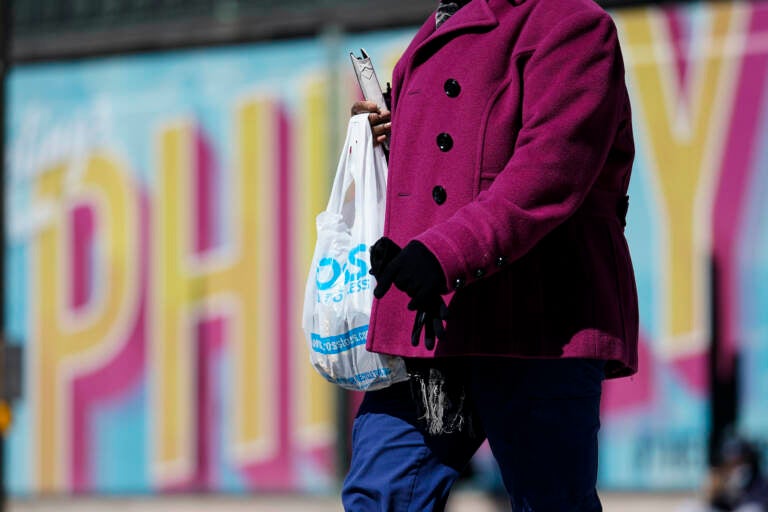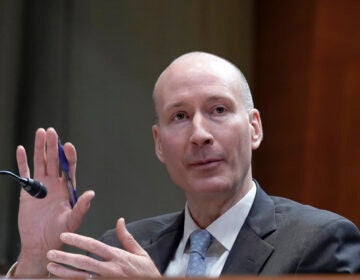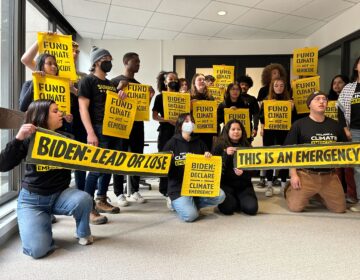Philly’s plastic bag ban is now fully in effect — enforcement included
After a six-month “awareness, education, and warning” period, the plastic bag ban now comes with financial penalties.

A pedestrian carries a plastic bag in Philadelphia, Wednesday, March 3, 2021. (AP Photo/Matt Rourke)
After a pandemic-induced delay, Philadelphia’s ban on single-use plastic bags is in full effect, enforcement and all.
City Council first passed the ban in late 2019 and implemented the law in October 2021. After a six-month “awareness, education, and warning” period, the prohibition now comes with consequences.
Businesses that continue using plastic bags may be fined, with a minimum penalty of $150. Repeat offenders may be taken to court by the city.
Here’s what you need to know about the ban:
Why are single-use plastic bags banned?
Mayor Jim Kenney has repeatedly cited the climate crisis and plastic pollution as serious societal threats, and has called the plastic bag ban an important step toward achieving the city’s environmental goals.
Officials point to the volume of bags the city uses — an estimated 1 billion per year — and the role they play in littering streets and waterways. The city also estimates it has wasted about 10,000 hours at recycling facilities retrieving bags, which are not recyclable but often end up mixed with recyclables, and untangling them from equipment.
What businesses are impacted?
The plastic bag ban affects all Philadelphia businesses that make bags available for carryout or delivery. That includes, but is not limited to:
- Supermarkets
- Convenience stores
- Shops
- Service stations
- Department stores
- Clothing stores
- Restaurants
- Food trucks
- Farmers’ markets
- Delivery services
What bags are banned?
The legislation prohibits retail establishments from providing for checkout or delivery:
- All single-use plastic bags
- Bags made from PLA (polylactic acid) created through a blown film extrusion process
- Paper bags that don’t use at least 40% recycled material
What bags are exempt?
The following bags are exempt:
- Dry cleaner bags
- Bags sold in packages containing multiple bags intended for use as garbage bags or to contain pet waste or yard waste
- Bags used to deliver perishable items like meat, fish, vegetables, and plants
- Bags provided by pharmacists to contain prescription drugs
- Newspaper bags
Are thicker plastic bags allowed?
Some retailers have opted for slightly thicker plastic bags which seemingly fall outside the city’s ban. These bags — which are thicker than 2.25 mils and may hold up for multiple reuses — are not permissible if they were made using a blown-film extrusion process, city officials stress.
“They’re still problematic for our recycling systems, and they’re still not good for the environment,” city spokesperson Karen Guss told WHYY News. “We’re looking to create behavior change here, not a thicker plastic bag.”
The city ordinance may be amended to clarify this point. The ban’s original sponsor, Councilmember Mark Squilla, has introduced a bill that would remove the 2.5 mils exemption from the ban’s definition of single-use plastic bags. The bill remains in committee.
Though Mayor Jim Kenney’s administration has yet to come out in support of any specific bill, Guss said it would support clearing up the confusion created by the 2.25 mils language by amending the ordinance for clarity.
How to report a business that’s violating the ban
Residents may report a business in violation of the plastic bag ban via the city’s 311 system, by phone, or online.
WHYY News’ Sophia Schmidt contributed reporting.
WHYY is your source for fact-based, in-depth journalism and information. As a nonprofit organization, we rely on financial support from readers like you. Please give today.








